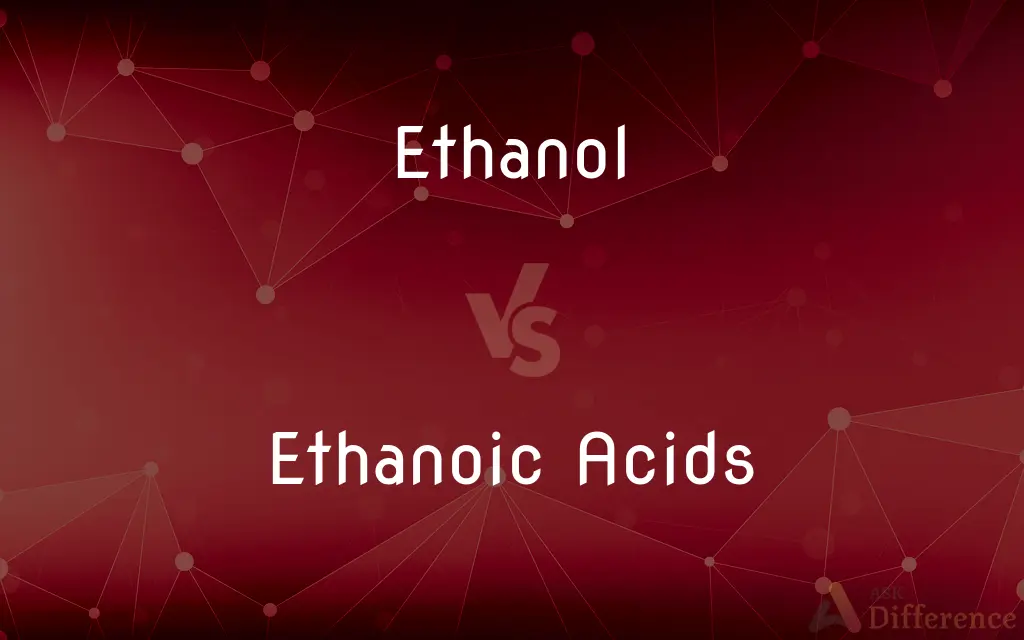Ethanol vs. Ethanoic Acids — What's the Difference?
By Tayyaba Rehman — Published on December 13, 2023
Ethanol is an alcohol used in beverages and fuel; Ethanoic Acid, also known as acetic acid, is a vinegar component.

Difference Between Ethanol and Ethanoic Acids
Table of Contents
ADVERTISEMENT
Key Differences
Ethanol and Ethanoic Acid are both organic compounds but serve different functions. Ethanol, commonly known as alcohol, is widely recognized as the active ingredient in alcoholic beverages. In contrast, Ethanoic Acid, often termed acetic acid, is the primary acid in vinegar, giving it its characteristic taste and smell.
Ethanol has a hydroxyl (-OH) functional group, making it an alcohol. It's a volatile, flammable liquid that can be produced through fermentation processes. Ethanoic Acid, on the other hand, has a carboxyl (-COOH) group, classifying it as a carboxylic acid. It has a pungent smell and is a key ingredient in the production of synthetic fibers and plastics.
In the world of chemistry, Ethanol is considered a solvent and is used in laboratories for various applications. It also has uses as an antiseptic and fuel (ethyl alcohol or ethanol fuel). Meanwhile, Ethanoic Acid is used extensively in food preservation due to its acidic nature. It also finds applications in the chemical industry.
Ethanol, when consumed, affects the central nervous system, creating a sense of euphoria in moderate amounts but leading to intoxication in excess. Conversely, Ethanoic Acid, although used in food, is not consumed in large amounts due to its strong acidity and pungent nature.
Ethanol is sometimes used as a biofuel, and its production from plants like corn and sugarcane is an area of ongoing research. Ethanoic Acid doesn't serve as a fuel but is essential in industries like textile, where it's used in the production of acetate fibers.
ADVERTISEMENT
Comparison Chart
Chemical Classification
Alcohol
Carboxylic acid
Functional Group
Hydroxyl (-OH)
Carboxyl (-COOH)
Primary Use
Beverages, antiseptic, fuel
Food preservation, synthetic fibers production
Taste & Smell
Neutral, spirit-like
Pungent, sour
Consumption Effects
Euphoria, intoxication
Strong acidity, not consumed in large amounts
Compare with Definitions
Ethanol
A solvent used in labs and industry.
The laboratory frequently uses Ethanol for its various experiments.
Ethanoic Acids
A chemical compound with the formula CH₃COOH.
In labs, Ethanoic Acid is often recognized by its formula.
Ethanol
A type of alcohol found in alcoholic beverages.
The wine's Ethanol content determines its alcohol percentage.
Ethanoic Acids
Used in the synthesis of plastics and fibers.
Ethanoic Acid plays a crucial role in producing certain synthetic materials.
Ethanol
A flammable liquid produced by fermentation.
Ethanol is derived from fermenting sugars found in crops.
Ethanoic Acids
A preservative in the food industry.
Many pickles are preserved using Ethanoic Acid.
Ethanol
An antiseptic for wounds and disinfecting surfaces.
The nurse cleaned the wound using Ethanol.
Ethanoic Acids
The primary acid found in vinegar.
The sour taste in vinegar comes from Ethanoic Acid.
Ethanol
A biofuel derived from plants.
Research on Ethanol as an alternative fuel source is promising.
Ethanoic Acids
A carboxylic acid with a pungent smell.
One can identify Ethanoic Acid by its strong, characteristic odor.
Ethanol
See alcohol.
Ethanol
(organic compound) A simple aliphatic alcohol formally derived from ethane by replacing one hydrogen atom with a hydroxyl group: CH3-CH2-OH.
Ethanol
Specifically, this alcohol as a fuel.
Ethanol
The organic compound C2H5.OH, the common alcohol which is the intoxicating agent in beer, wine, and other fermented and distilled liquors; called also ethyl alcohol. It is used pure or denatured as a solvent or in medicines and colognes and cleaning solutions, or mixed in gasoline as a fuel for automobiles, and as a rocket fuel (as in the V-2 rocket).
Ethanol
The intoxicating agent in fermented and distilled liquors; used pure or denatured as a solvent or in medicines and colognes and cleaning solutions and rocket fuel; proposed as a renewable clean-burning additive to gasoline
Common Curiosities
Is Ethanol safe for consumption in large amounts?
No, excessive consumption of Ethanol can lead to alcohol poisoning and other health issues.
What gives vinegar its characteristic sour taste?
The sour taste of vinegar comes from Ethanoic Acid.
What is the primary function of Ethanol in beverages?
Ethanol is the active ingredient that causes intoxication in alcoholic beverages.
Can Ethanoic Acid be used as a disinfectant?
While Ethanoic Acid has antimicrobial properties, it's more commonly used in food preservation.
Is Ethanoic Acid found in any other products besides vinegar?
Yes, Ethanoic Acid is used in the synthesis of plastics, synthetic fibers, and other chemicals.
Are there non-drinking applications for Ethanol?
Yes, besides drinking, Ethanol is used as a solvent, disinfectant, and fuel, among other applications.
What is the main source of Ethanol production?
Ethanol is primarily produced by fermenting sugars from crops like corn or sugarcane.
Why is Ethanol sometimes used as fuel?
Ethanol is a renewable biofuel that can be blended with gasoline to reduce greenhouse gas emissions.
How is Ethanoic Acid produced industrially?
Industrially, Ethanoic Acid can be produced by the oxidation of acetaldehyde or through methanol carbonylation.
How is Ethanol used in the medical field?
Ethanol is used as an antiseptic to disinfect wounds and surfaces, and sometimes as a treatment for methanol or ethylene glycol poisoning.
Are there health implications for consuming Ethanoic Acid?
While Ethanoic Acid is safe in small amounts like in food, concentrated forms can be corrosive and harmful.
Can Ethanol be produced synthetically?
While Ethanol is typically derived from plants, it can also be produced synthetically from petrochemical feedstocks.
Why isn't Ethanoic Acid consumed in large amounts like Ethanol in beverages?
Ethanoic Acid has a strong acidity and pungent taste, making it unsuitable for consumption in large quantities.
Is Ethanol effective against bacteria and viruses?
Yes, Ethanol has antimicrobial properties and can kill many bacteria and viruses when used in appropriate concentrations.
What other names is Ethanoic Acid known by?
Ethanoic Acid is also commonly known as acetic acid.
Share Your Discovery

Previous Comparison
Red Potatoes vs. White Potatoes
Next Comparison
Window Port vs. View PortAuthor Spotlight
Written by
Tayyaba RehmanTayyaba Rehman is a distinguished writer, currently serving as a primary contributor to askdifference.com. As a researcher in semantics and etymology, Tayyaba's passion for the complexity of languages and their distinctions has found a perfect home on the platform. Tayyaba delves into the intricacies of language, distinguishing between commonly confused words and phrases, thereby providing clarity for readers worldwide.












































